Over the years, most employers have become accustomed to asking for salary history during the interview or pre-screening process to determine if an applicant should move forward in the hiring process. Most employment applications also inquire about an applicant’s prior convictions. However, more and more state and local governments are adopting bans on employer inquiries into a job applicant’s pay and criminal history. Employers need to ensure their hiring practices are compliant, especially as recruiting crosses state lines.
Over 20 state and local governments have adopted pay history bans. Pay history bans are frequently rolled into a state or local government’s overarching equal pay laws. Such bans are aimed at addressing existing pay disparities – especially those adversely affecting women and people of color – by ensuring that employers base compensation decisions on employees’ qualifications, duties and responsibilities.
Pay history bans prohibit employers from inquiring about an applicant’s prior pay during the pre-employment process or considering that information when making interview, hiring, or compensation decisions. Other facets of the laws are designed to eliminate secrecy and promote transparency by prohibiting employers from restricting their own employees from disclosing their current pay to applicants or to one another in the workplace. Some of the new pay history bans also require employers to provide the applicable pay range upon request by an applicant or include the pay range with any job posting.
There has also been an expansion of criminal history bans, often called “ban the box” or “fair chance” laws. These bans, adopted by over 30 state and local governments to date, are meant to even the playing field and provide a second chance for individuals with an arrest or conviction record. Criminal history bans prohibit employers from requiring applicants to disclose if they have been convicted of a crime. The laws generally permit employers to inquire into a prospective employee’s criminal history after subsequent steps in the hiring process: after an initial screening but before an interview, after an interview, or after a conditional job offer.
These bans have not yet been adopted in Wisconsin, but they impact employers recruiting with national searches or for locations outside of Wisconsin, and they aren’t going away. It’s a good time to review your hiring policies and procedures to make sure that they comply with these legal requirements and reflect your organization’s culture, mission, and values.
The attorneys and HR professionals at Lake Effect HR & Law are ready to assist and advise if you have questions related to your recruiting and hiring policies and procedures in Wisconsin or other states. Contact us at info@LE-hrlaw.com or 1-844-333-5253.




